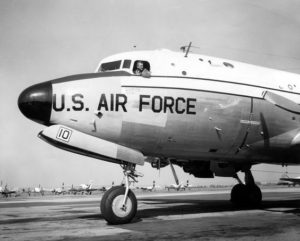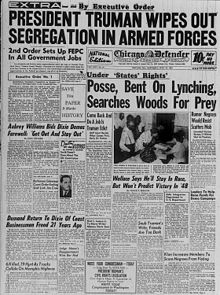
It would seem that July 26 is a rather important day in the presidency of Harry S. Truman. He signed two major pieces of legislation on that day, one in 1947 and one in 1948. Both continue to have impacts on our country today.
In 1947, Truman signed the National Security Act, which reorganized the intelligence agencies and armed forces. The act created the Department of Defense. Prior to this the United States had the Department of War and the Department of the Navy. With the Department of Defense, all of the armed forces would come under one umbrella, including the newly created Air Force, which had previously been the Army Air Forces. The National Security Act also created the Joint Chiefs of Staff, which was made up of the senior uniformed commanders of the armed forces. The first Joint Chiefs of Staff included Admiral William Leahy, USN; General George Marshall, USA; Admiral Ernest King, USN and General Henry Arnold, who was an Army General and later reappointed as a General of the newly created Air Force.
The 1947 National Security Act created two national security agencies: the National Security Council, which makes sure the players in the defense and security of the United States are synchronized with one another, and the Central Intelligence Agency, a non military agency that is responsible for the monitoring and reporting of security of the country and its interests aboard to the president and his team of senior officials. The agency’s first director was Roscoe H. Hillenkkoetter. It is interesting to note before the agency was created, the post of Director of Central Intelligence was created in 1946 by Truman. The second person to hold that position was General Hoyt S. Vandenburg. To those familiar with Key West, we have the USS Hoyt S. Vandenburg, a former missile tracking ship, sunk off the island as an artificial reef. Other directors have included former President George W. Bush, Robert Gates and James Schlesinger. The current director is Gina Haspel, the first woman to hold the position.
In 1948, Truman passed one of the most important pieces of legislation of his presidency, Executive Order 9981, the desegregation of the military. The military was not quick to accept this order and failure to act on it resulted in Kenneth Royall to retire from his post as Secretary of the Army in 1949 because he would not eliminate segregation in the U.S. Army. Prior to the order, there were separate military training bases for white and black soldiers and all black units, including the Tuskegee Airmen, 11 Tank Destroyer Divisions, 24 Field Artillery Battalions, 7 Field Artillery Regiments, 3 Tank Battalions, 1 Parachute Infantry Battalion, and 8 Cavalry and Infantry Regiments. Black military nurses and doctors could not treat white soldiers and donated blood from African Americans could not be used on white sailors and soldiers. In 1989, forty two years after the signing Executive Order 9981, President George H.W. Bush appointed General Colin Powell as Chairman of the Joint Chiefs of Staff, the highest ranking military person in the country and the first African American to hold that position.
Executive Order 9981 says in its entirety:
Whereas it is essential that there be maintained in the armed services of the United States the highest standards of democracy, with equality of treatment and opportunity for all those who serve in our country’s defense:
Now, therefore, by virtue of the authority vested in me as President of the United States, and as Commander in Chief of the armed services, it is hereby ordered as follows:
1. It is hereby declared to be the policy of the President that there shall be equality of treatment and opportunity for all persons in the armed services without regard to race, color, religion or national origin. This policy shall be put into effect as rapidly as possible, having due regard to the time required to effectuate any necessary changes without impairing efficiency or morale.
2. There shall be created in the National Military Establishment an advisory committee to be known as the President’s Committee on Equality of Treatment and Opportunity in the Armed Services, which shall be composed of seven members to be designated by the President.
3. The Committee is authorized on behalf of the President to examine into the rules, procedures and practices of the armed services in order to determine in what respect such rules, procedures and practices may be altered or improved with a view to carrying out the policy of this order. The Committee shall confer and advise with the Secretary of Defense, the Secretary of the Army, the Secretary of the Navy, and the Secretary of the Air Force, and shall make such recommendations to the President and to said Secretaries as in the judgment of the Committee will effectuate the policy hereof.
4. All executive departments and agencies of the Federal Government are authorized and directed to cooperate with the Committee in its work, and to furnish the Committee such information or the services of such persons as the Committee may require in the performance of its duties.
5. When requested by the Committee to do so, persons in the armed services or in any of the executive departments and agencies of the Federal Government shall testify before the Committee and shall make available for the use of the Committee such documents and other information as the Committee may require.
6. The Committee shall continue to exist until such time as the President shall terminate its existence by Executive Order.
HARRY S. TRUMAN
The White House
July 26, 1948
